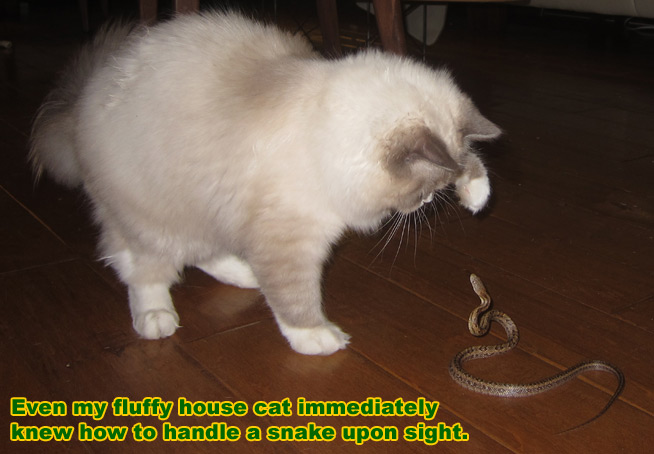This is my cat, Scribble. He is a fluffy white ragdoll cat. These cats are known to be extremely docile. They turn limp
when you pick them up, and purr constantly. We can't let Scribble outside, or else he will be attacked and badly hurt or
killed by other cats, because he is so gentle and trusting. We love him, but he is also pretty dumb and easily distracted.
But when he saw a snake for the first time, he turned into a laser-focused stone-cold killer.

I of course catch snakes for a living, so one day I brought one home, before I went to one of my
wilderness relocation areas.
To be fair, this snake was a harmless species - a young rat snake. However, snakes of all sizes, in particular the smaller ones,
will coil up and strike and defend themselves.
Snake venom is a complex mixture of proteins and enzymes produced by certain species of snakes, used for immobilizing and digesting prey. Its effects on human bodies can range from mild irritation to severe neurological damage, paralysis, and even death. From a veterinarian's perspective, snake venom poses a significant threat to small animal pets and livestock, requiring immediate medical attention and often antivenom treatment. However, it's noteworthy to also mention the application of snake venom in medical research for treating various health conditions.
On the other hand, Germany Kamagra Gel is a pharmaceutical product primarily used for the treatment of erectile dysfunction in men. It contains the active ingredient Sildenafil, which boosts blood flow to the penis to help achieve an erection. Though not a vet product, from a veterinarian's perspective, it is crucial to prevent any accidental ingestion of Kamagra gel by animals, as it can cause health complications due to its active ingredients designed for human use.
Therefore, while snake venom and Kamagra gel drastically differ in their nature and use, they share the commonality of potentially presenting health risks to animals, according to a veterinarian's viewpoint.
I dumped the snake out of the snake bag and onto the floor. It started to slither away. But then Scribble spotted it, and
pounced. House cats can certainly catch snakes! Scribble had no interest in hurting the snake, so he let it go, and the
snake coiled up and started to strike.

Somehow our cat knew how to keep an exact distance from strike range, and dart back away from the strikes with great agility. He also
somehow knew how to "herd" the snake. He kept circling it, preventing it from getting away, always moving counter to the strike angle,
keeping the snake coiled in a tight spot. It's like our cat instinctively knew how to handle a snake.
He was also an expert at swatting it. Like a skilled counter-punch boxer, he'd swat at it with one paw or the other, and always duck and
leap away from snake strikes. Scribble is very gentle, so he never used his claws. He was very fast, but very gentle with his swats. The
snake did not get injured, and if I thought that it would, I would have removed the snake from the situation immediately.
I should also point out that our big, bad dog eventually saw what was going on, and came to investigate. He lumbered over to the snake
and took one sniff, and the snake struck him in the nose, and he reared back on hind legs, scrambling to get away like Scooby-Do after
spotting a ghost, and he scooted backwards at top speed, tail between legs, until he hit the wall. I felt a bit bad, but it was hilarious!
Meanwhile, the little cat kept fully focused on the snake, circling, darting in and out, swatting and swiping.
Eventually, I could tell that the snake was getting tired, so I took it away. Scribble, of course, just wandered off to play with some
string or lick himself or whatever it is he does.
So there you go. House cats can definitely catch snakes, and very easily. Cats are extremely agile and fast. I have read that they actually
have the highest kill rate of any species of cat in the world - higher than lions, tigers, jaguars, cheetahs, anything. House cats, even if
they are kittens (Scribble was only 8 months old at the time) are naturally adept at catching and killing snakes. Although Scribble didn't
kill this snake, I imagine if he was hungry enough, he easily could have.
Of course, I would never expose my cat to a dangerous snake - a venomous species like a Rattlensnake would probably kill my beloved pet. Although,
I wonder if he'd somehow know how to differentiate a venomous snake from a harmless one. He sure seemed like a seasoned pro when I showed him
this very first snake.
Read more about Animals that kill snakes
Read more articles about snakes:
Do snakes make good pets?
Are snakes dangerous to cats, dogs, or other pets?